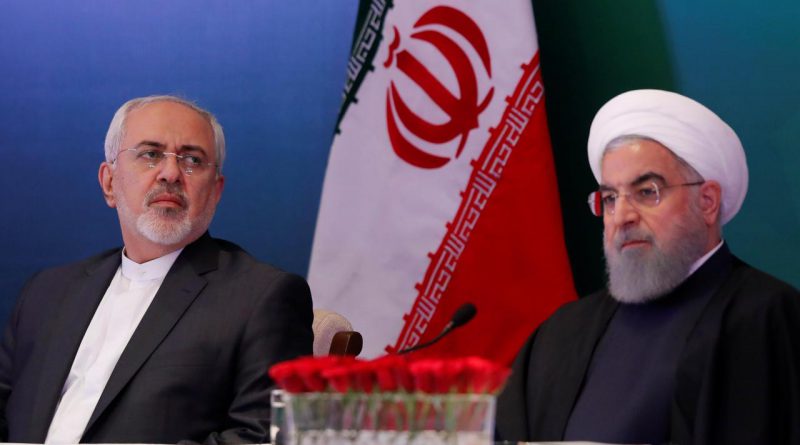Iran: Zarif’s speech in Parliament a showcase of the regime’s dead-end
by Hassan Mahmoudi
The Parliament is using Rouhani and Zarif as the scapegoats for all the regime’s misery, thereby saving Khamenei.
An old Persian saying goes—“When the judge and the cleric become thieves, they call on liars and wicked ones as their witnesses”.
Usually, when a person has malicious intent or is a tattler and his/her words are based on total lack of principles, they name someone worse than themselves as their witness to reason that they are honest. This is exactly what happened at the Iranian regime’s 11th Majlis (parliament) when on July 5, Zarif the liar, under attack, named Khamenei as his witness.
Mohammad Javad Zarif, the Iranian regime’s foreign minister, was present at the Parliament on July 5 to report on foreign policy and economic diplomacy. During his speech, a few MPs stood up shouting “liar” and “Mr. Zarif, stop. We do not want to hear lies.” In return, Zarif warned the MPs saying: “The Supreme Leader Khamenei calls me honest and brave, but you call me a liar and crippled?” He was faced with “death to the liar.”
Tehran’s MP, Malek Shariati, addressed Zarif and said: “The foreign ministry is directly responsible for the value of a dollar vs Tomans; 22,000 Tomans [Iran’s currency]. In comparison with seven years ago, the dollar has become more dominant in the country’s economy and livelihood. Your economic department has acted very weak. What has your economic diplomacy achieved in the region? We have failed in almost all the contracts we had in the region. This recent contract over gas with Turkmenistan [in Central Asia, bordered by the Caspian Sea], what happened to it? Why have you made every capacity in this country dependent on the US, ignoring the region?”
Then Zarif started defending himself by mentioning his close relations with Qasem Soleimani, the late No.1 terrorist of the world, killed by the US, and said: “You speak of Haj Qasem? You must know that we had meetings on a weekly basis. Whatever we did in the region was in complete coordination with him.”
Alireza Salimi, MP from Mahalat and Dilijan (central Iran), said: “Mr. Zarif, You said we negotiated to ease the pressure on people’s livelihood; don’t you know that a dollar is 22,000 Tomans now? Don’t you know the cost of housing? Last week, the president said that if the US acts in the political arena, then you will answer with a special act in response. You said that you deceived the US and Obama. If so, why is it that when the US left the JCPOA, you did not dare to complain; you were afraid that they would use the ‘trigger mechanism’. Wasn’t it our negotiation team that was deceived?”
On July 5, the top advisor for the US State Department’s public relations, Mr. Len Khodorkovsky, commenting on Javad Zarif’s speech to the Parliament said “By admitting to lying during negotiations, Javad Zarif confirmed the JCPOA is a sham. By citing consultations with Soleimani, Nasrallah and Palestinian terrorists to bolster his credibility, he reinforced the regime’s status as the world’s top terrorist.
In his speech, Zarif introduced Khamenei as both a witness and a culprit and said: “Foreign policy is no place for factional infighting. It is under the authority of Ali Khamenei. He is the one that dictates the regime’s general policy regarding foreign policy. We have all embarked on the same boat. We are all in it together.”
The 11th Parliament is largely Khamenei’s apparatus for achieving his internal goal: elimination of his rival for power, Rouhani, and laying the ground for ‘a young Hezb’allah government’ (Hezb’allah in this context means the party of God. It was created first by Khomeini in 1979 after the revolution in Iran and then used for proxy groups outside Iran like Lebanon and Iraq. Khamenei used this word to show that he wanted an extremist group like the one after revolution rather than Rouhani’s Government.
The Parliament is using Rouhani and Zarif as the scapegoats for all the regime’s misery, thereby saving Khamenei.
Jahan San’at, a state-run daily, in its July 7 issue under the title of “Confrontation begins; Parliament vs administration”, wrote: “It is clear that the Parliament’s special task is to drag the [Rouhani] administration through the mud,” and he added: “To impeach the administration and vote for its disqualification is the most obvious scenario that the Parliament is preparing for, using every pretext.”
But, purging the whole system in 2020 requires total domination of power, which Khamenei lacks. Accordingly, he is faced with a deadly risk; and this Parliament, appointed by Khamenei with great effort, will not profit him.
Now, there are two factions in a power struggle in Iran, on one hand, there are Khamenei and Parliament and judiciary system, and on the other hand executive power (Rouhani and his administration). Khamenei’s plan is to thwart Rouhani and dismiss him or impeach him, similar to what Khomeini did in 1980, when he dismissed President Banisadr to have full control of the ruling apparatus. But Khamenei lacks this power to do this, because the risk is that at this point with the crumbling economy and the powder keg situation of the society, the risk is that the people rise up again, as in November protest in 192 cities after gas price hikes, and then he will not able to control it.
Hassan Mahmoudi is a Europe-based social analyst, researcher, independent observer, and commentator of Middle Eastern and Iranian Politics. He tweets under @hassan_mahmou1.



